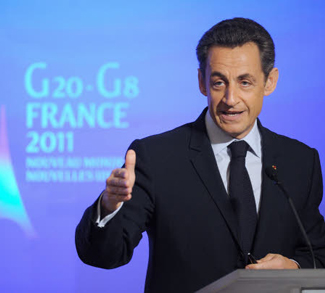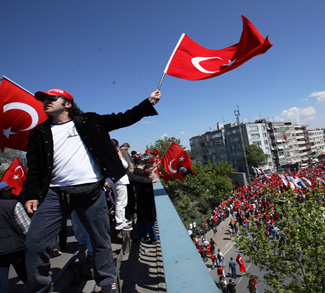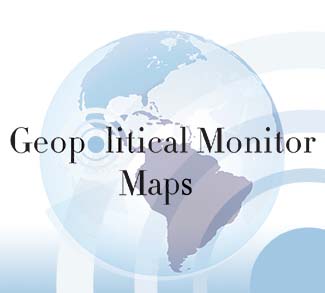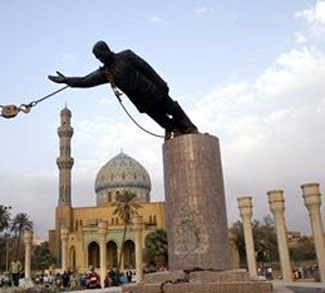Summary
In the last weeks, both a group of diplomats and a former director of the General Directorate of External Security launched methodical attacks questioning President Nicolas Sarkozy’s foreign policy.
Analysis
“Europe is powerless, Africa escapes us, the Mediterranean will not talk to us, China has crushed us and Washington ignores us”, published Marly, a group of 30 anonymous active and retired diplomats, whose discontent over several years of “an amateurish and impulsive foreign policy focused on [President Sarkozy’s] personal glory” went public in Le Monde newspaper on Feb. 24. Two days before, Prefect Claude Silberzahn took a similar step in publishing in Liberation under the title of “The flops of French intelligence” an appalling assessment of the executive authority over their analysis of the political situation in Tunisia and Egypt, the eight hostages “scattered somewhere between the Middle East and Africa”, and the four casualties among the hostages in three rescue attempts in Somalia, Mauritania and Niger.
France has a long history of prominent foreign policy. The country has 158 embassies and 97 consulates across the world with an average of 2 million citizens living overseas. It is the 2nd largest diplomatic network after the US. It is a charter member of the United Nations, holds a permanent seat in the UN Security Council and is a member of most of the UN related agencies with which France has a permanent seat in 17 multilateral missions. The country is a founding member of the NATO alliance in 1948.
President François Mitterrand (1981-1995) promoted European unity and peaceful relationships with France’s former colonies, in particular opposing in 1990 the devaluation of the CFA Franc. He supported the idea of a larger Europe, improved French and German relations and played a key role in the Maastricht Treaty and the European Single Act. Under Mitterrand’s presidency, France took part in several conflicts with the UN, in particular the Gulf War (1990–1991) and former Yugoslavia (1992-1995).
President Jacques Chirac (1995-2007) was known to have excellent foreign relations, in particular with France’s former African colonies, despite a lack of anticipation in the African political, economical and social changes which led to a loss of political influence and a decrease in economic investments. France rejoined NATO’s military committee in 1995. The country took part in the conflicts in Kosovo (1999) and Afghanistan (2001). In 2003, despite US pressure, Chirac stood firm before the UN Security Council, refusing to send military troops to Iraq, and rallied other governments to his position. Jacques Chirac was also much concerned with environmental issues and promoted international action to curb global warming.
In 2007, immediately after his election, President Sarkozy announced a series of change of course on a number of foreign policy issues, the first being France’s relations with the United States. Recalling Chirac’s 2003 position on Iraq, he stated in his first speech after victory that “our separation was tragic”. Sarkozy subsequently appeared as the most pro-American president under the 5th Republic. The next change was France’s position within NATO. Though a founding member, France withdrew from the integrated military command in 1966 under President Charles de Gaulle, yet remaining a member of the alliance. President Sarkozy early supported and promoted the idea of an integrated European defence including renovating France’s relations with NATO, which led in 2009 of the re-integration of the country in the integrated military command. The third change concerned Europe: he abandoned Chirac’s idea of a European Union constitution and called for a pause to further expansion.
Concerns over President Sarkozy’s foreign policy started 2 months after his election in May 2007. Delivering a speech in Dakar, Senegal, he made reference to the “African peasants” stating that “The tragedy of Africa is that the African has never really entered into history.” His remarks were widely condemned. When it comes to the Middle-East, France’s attitude seems to lack coherence: President Sarkozy is qualified pro-Arabs by some and pro-Israeli by others. Despite France’s rapprochement with the US, which might have been a shift in the traditional policy of support for the Arab countries, President Sarkozy re-assured Arab leaders of his support. He wanted to be an efficient intermediary in the Iraeli-Palestinian peace process; yet Ehud Omert ignored Sarkozy’s proposal of ceasefire. He wanted a rapprochement with Syria which had long been sidelined as a country supporting terrorism; he faced the fact it gave no more power to France over the Palestinian Hamas, supported by Syria.
More recently, the case of Florence Cassez, a French citizen serving a 60-year sentence in Mexico for belonging to a kidnapping gang, had a significant impact on French-Mexican relations. Unhappy with the outcomes of Cassez’s trail, President Sarkozy started interfering with Mexico’s legal affairs, lecturing the Mexican judges in a country dealing daily with a devastating war against drug cartels. Mexico’s government subsequently cancelled Year of Mexico celebrations in France. A Mexican author, Carlos Fuentes, in the Feb. 15 issue of El Universal newspaper, referred to Trujillo to compare Sarkozy’s behaviour to the one of a dictator and suggested that Sarkozy used Cassez’s case politically as he struggles with his lowest ever national approval ratings. A mid-February poll in the newspaper Libération shows that 72% of the French people think their country’s image in the world has deteriorated under Sarkozy’s presidency. Quite of a concern for the President as France is the current chair of the G20, hosts the next G8 summit in Deauville in May and is preparing the presidential election next year.
No doubt, Nicolas Sarkozy changed the face of the French presidency. Just the opposite of the public discretion and cautious approach of his predecessors, he seems to be constantly overwhelmed by a stream of new and challenging ideas. In a will to make sure his ideas are properly conveyed and dealt with, he wants to be present everywhere and all the time, hence has he been granted the nickname of “hyper-President”. Even so, his uncountable thoughts and ideas have been followed by relatively few actions on the ground in his years of presidency, and very few people – if none – are able to see what his political lines are and where France is going.




